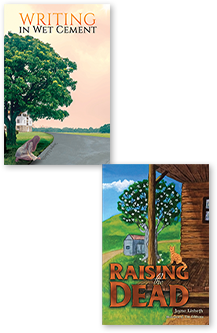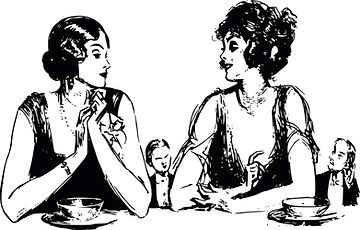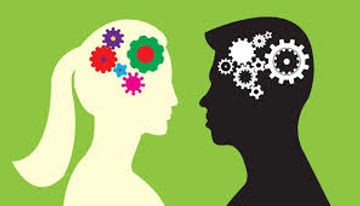
What did I do wrong?

Recently I had that special, cherished, looked-forward to experience: lunch with a dear friend.
Jean and I met in 1991. She immediately captured my heart through our mutual love of books and reading. As she rocked her 1 ½ year-old-son on her lap and hopped up to serve wine and Jimmie Dean Sausage rolls, we could not stop talking. Since my move to Tampa in 1989 she was the first woman I had met who loved reading and books as much as I do. We shared our favourite authors as the men talked soccer, football and baseball.
Our friendship over the last 32 years has evolved and grown. Through divorce, raising children, family problems and joys, grandchildren, jobs, the vicissitudes of life and the wrinkles of living, we have only grown closer. And wiser.
Jean has always been an “old soul” with a youthful heart. Growing up in a house with five siblings, one bathroom, a devoted mom and dad and lots of family love, lore, wisdom and stories Jean has anchored me. Her dad actually changed diapers at a time when most men would never dream of doing so. Her mother was a font of wisdom and endless stories. Her parents’ love and wisdom cemented all six of their children.
Today, our luncheon conversation focused on relationships between women as we discussed my latest book, Raising the Dead and my 2019 memoir, Writing in Wet Cement. I admitted that Writing in Wet Cement had been painful, cathartic and necessary to write, which allowed me to joyfully write Raising the Dead. I told Jean, “You know, no book is ever 100% fiction. We filter our words through our life’s experiences, friends, lovers and partners. We can’t escape ourselves or our pasts.”
That brought us to my memoir. Writing in Wet Cement, chock full of joy, pain, recognizing and escaping abusive relationships.
I confessed, “You know, Jean, I’ve finally recognized that I am a victim of my own abuse. I’ve allowed people to steamroll over me.”
Jean, in her infinite wisdom, gave me two tips:
1. From her mom: “You teach people how to treat you.”
2. From Maya Angelou: “When someone shows you who they are, believe them the first time.”
Jean’s words screamed in my mind as I sat down later to have a trim at my favourite salon. A new stylist began clipping and initiated the usual conversation, who are you, what do you do, etcetera.
I told her I’m a writer and have just published my second book, Raising the Dead. I shared Writing in Wet Cement, my memoir, regarding emotional abuse in relationships. Sheila was silent for a moment. She put her scissors to her side. It appeared she had made a decision.
“Yeah.” she said. “I’ve been in a relationship like that.”
I probed a little deeper, following that trail of crumbs women leave for one another. My hair fell, making wispy patterns around my shoulders. I studied Sheila, wondering how much I should intrude. I finally continued. “What happened? Was it emotional or physical abuse?”

As she began clipping my hair again, the background sound of scissors accompanied her words, “Both.” She said.
“Wow. How did you get out of that relationship?” I asked.
She chuckled, joylessly. “He’s in jail.”
I took a deep breath, tried to remain impartial. “Did you have children together?”
“No. But I have one daughter now.” Sheila’s face brightened. “I married, but that ended, and I raised my daughter alone. She’s in college now, in her third year.” Rightfully so, Sheila’s words were tinged with pride.
She began clipping again as I congratulated her on her daughter’s successful college career. “So,” I asked, “are you in a relationship now?”

She rotated her salon chair to face me, assessing my cut. She began confiding again.
"Well, I thought I was. Then he just disappeared. Won’t answer my calls or my texts. I don’t know what I did wrong.”
Her words took my breath away. I stopped her in mid clip, looked at her and said,
Sheila, did you just hear yourself? Did you hear what you just said?”
She looked puzzled. I said, “You didn’t do ANYTHING wrong, from what you’ve told me.”
Sheila was shocked. Then the floodgates opened. She talked of she and her partner’s positive relationship, their joys, and his subsequent unexpected disappearance.
She talked of the previous abusive relationships she had fled and how none of the women in her family or her female friends had supported her. They always supported the abuser, the man who had made this woman’s life miserable.
Standing behind the mirror, Sheila and I locked eyes. “Why do women do that to one another? Every woman, my mom, my sisters, my cousins, all blamed me for every failed relationship. Why do women do that? Why do we women attack one another?” she asked.
I had no answers. Jealousy? Competition? Lack of confidence? What?
Jean’s words resounded in my mind, via Maya Angelou, “When somebody shows you who they are, believe them the first time.” Yet, I wondered, how do we overcome this added judgment and abuse delivered to us from beloved women in our lives?
I stood up, dusted off the shorn tendrils from my shoulders, and faced Sheila, eye to eye,
“You did NOTHING wrong. Do you hear me? You loved this man. You opened your home and your heart to him. You gave him joy. You teach people how to treat you. He didn’t learn.
This woman taught me a lesson as she cut my hair, and I had taught her one as I listened to her story.
We all have stories worth telling. We just need to listen.

Post Views : 527